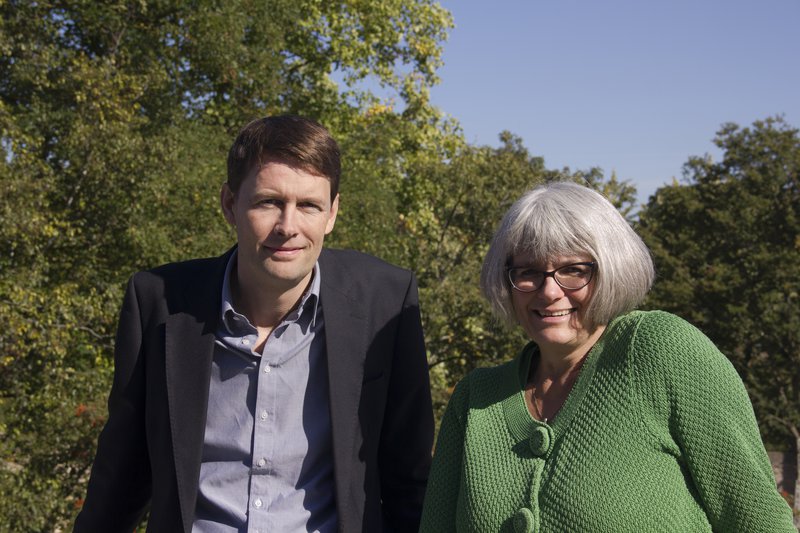Academic distinction recognised

Professor Carolyne Larrington is Professor of Medieval European Literature
Professor Larrington's research interests are in Old Icelandic literature, medieval women's
writing, European Arthurian literature and, most recently, emotion in medieval literature,
particularly in European secular literature and
in Old Norse. She has published on Old English and Old Icelandic
wisdom poetry, women and writing in medieval Europe, Eddic poetry, King
Arthur’s enchantresses, and sibling relations in European medieval literature. Her book on British folklore, The Land of the Green Man, has been shortlisted for the
Katharine Briggs Folklore Award 2016, a prize established by the Folklore Society to encourage the study of
folklore. A BBC Radio 4 series based on The Land of the Green Man was broadcast
in September 2015.
In 2015 Carolyne published Winter is Coming: the Medieval
World of Game of Thrones, exploring the historical inspiration behind this fantasy
phenomenon. A second Game of Thrones
book is in progress. For Michaelmas term 2016 she will be a Distinguished International Visitor at the Centre for the History of Emotion at the University of Western Australia.
- Hear Carolyne's BBC Radio 4 series here.
- Hear a talk Carolyne gave at the Ashmolean Museum on Winter is Coming here.
- Hear Carolyne in conversation with the President, Maggie Snowling, here.
Professor Nikolaj Lubecker is
Professor of French and Film Studies
Professor Lubecker's research interests include avant-garde literature and culture, critical theory,
and contemporary cinema. His current research focuses on the
so-called ‘non-human turn’ in the humanities. Under this label one can find a
diverse set of theoretical and philosophical texts that seek to reconsider what
it means to be human in an age of phenomena such cloning, bio-engineering and
climate crisis. He is interested in how literature and film can contribute to
the thinking of this contemporary situation. In a number of articles and
shorter projects, he is therefore exploring this idea in relation to
contemporary films by directors such as Jean-Claude Rousseau, James Benning and
others, or to mid- to late 19th-century French poets such as Baudelaire and
Verlaine.
He has published two books on
French literature and intellectual history, and most recently a book on
contemporary European and American art cinema: The Feel-Bad Film (2015). In all of these he is interested in how
literature and film responds – and contributes – to social and political
debates.

Professor Daria Martin is Professor of Fine Art and a
practising artist
Professor Martin's 16mm
films aim to create a continuity or parity between disparate artistic media
(such as painting and performance), between people and objects, and between
internal and social worlds. Human gesture and seductive imagery meet
physically mannered artifice to pry loose viewers’ learned habits of
perception.
Subjects such as robots, an archive of dream diaries and close-up card magic,
are explored within isolated spaces such as the wings of a theatre, a military
academy, or a scaled up modernist sculpture. These protective yet fragmented
settings, full of seams and shadows, stand in for the capacities of the film
medium itself, a permeable container that consumes and recycles the world at
large.
Some areas of research that inspire her work include historical and contemporary
notions of the gesamtkunstwerk (total
artwork), cinematic theories of embodied spectatorship, postmodern dance’s
task-based movements, scientific and artistic investigations of synaesthesia, feminist and
gender theory, and the anthropological concept of animism.
- See some
of Daria’s work here.
Recognition of Distinction Awards are assessed using three criteria:
- an ongoing research record which is characterised by a significant
influence on the field of study and is of a high order of excellence and of
international standing, and the quality of which in terms of research
distinction is at least equal to that expected of those appointed to full
professorships at other leading international research universities.
- a record of effective teaching for the University and for colleges,
concomitant with the duties of the University post and the college fellowship, where
one is held.
- a record of involvement in University and/or college administration and demonstrable competence in such administration.